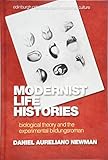Modernist Life Histories : Biological Theory and The Experimental Bildungsroman / Daniel Aureliano Newman.
Material type: TextSeries: Edinburgh Critical Studies in Modernist Culture : ECCSMCPublisher: Edinburgh : Edinburgh University Press, [2022]Copyright date: ©2018Description: 1 online resource (248 p.) : 2 B/W illustrations 4 B/W line artContent type:
TextSeries: Edinburgh Critical Studies in Modernist Culture : ECCSMCPublisher: Edinburgh : Edinburgh University Press, [2022]Copyright date: ©2018Description: 1 online resource (248 p.) : 2 B/W illustrations 4 B/W line artContent type: - 9781474439619
- 9781474439633
- 809.3/9353
- online - DeGruyter
| Item type | Current library | Call number | URL | Status | Notes | Barcode | |
|---|---|---|---|---|---|---|---|
 eBook
eBook
|
Biblioteca "Angelicum" Pont. Univ. S.Tommaso d'Aquino Nuvola online | online - DeGruyter (Browse shelf(Opens below)) | Online access | Not for loan (Accesso limitato) | Accesso per gli utenti autorizzati / Access for authorized users | (dgr)9781474439633 |
Frontmatter -- CONTENTS -- List of Figures -- Preface -- Acknowledgements -- Series Editors’ Preface -- List of Abbreviations -- Introduction -- 1 Bildung, Biology and the Narrative Structure of Development -- 2 A Portrait of the Artist as a ‘Biologist in Words’: Language, Epiphany and Atavistic Bildung -- 3 Mendelian Inheritance, ‘Eternal Differences’ and Entropy in Howards End -- 4 ‘Tampering with the Expected Sequence’: Heterochrony and Sex Change in Orlando -- 5 Anachrony, Neoteny and the ‘Education of an Amphibian’ in Eyeless in Gaza -- 6 Beginning Again: Darwin’s Caterpillar from George Eliot to Beckett -- Conclusion -- Bibliography -- Index
restricted access online access with authorization star
http://purl.org/coar/access_right/c_16ec
Reflects contemporary paradigm shifts in embryology and evolutionary theory through formal experimentation in the modernist BildungsromanProvides a unique perspective on the Bildungsroman (novel of formation), one of the most discussed genres in recent scholarly work on modernismApproaches the study of science and literature with exceptionally close attention to the details of scientific models, their cultural appropriations, and their political implicationsMakes the first thoroughgoing argument for twentieth-century biology as a positive influence on modernist poetics and ethicsModels how narrative theory can serve the goals of interdisciplinary researchModernist Life Histories explores how new models of embryonic development helped inspire new kinds of coming-of-age plots during the first half of the twentieth century. Focusing on novels by E. M. Forster, James Joyce, Virginia Woolf, Aldous Huxley and Samuel Beckett, the book links narrative experiments with shuffled chronology, repeated beginnings and sex change to new discoveries in the biological sciences. It also reveals new connections between the so-called Two Cultures by highlighting how scientific ideas and narratives enter the literary realm.
Mode of access: Internet via World Wide Web.
In English.
Description based on online resource; title from PDF title page (publisher's Web site, viewed 29. Jun 2022)


